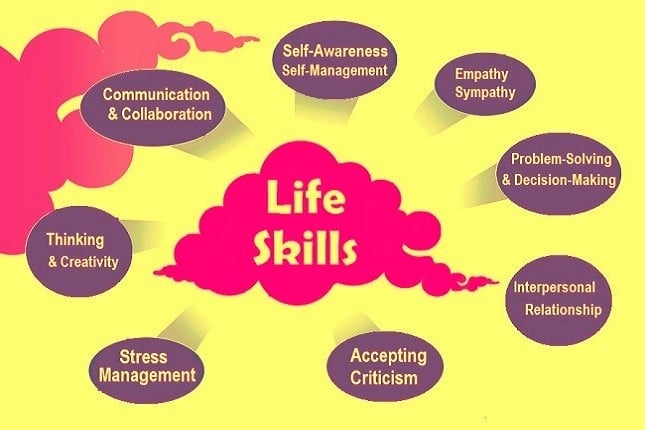Written by Russ Gadzhiev, PhD
“I think it just helps to be very aware that fundamentally, there are no adults. Everyone is making it up as they go along. You have to find your own path, picking, choosing, taking and discarding as you see fit.” – Naval Ravikant
“I think, as you’re growing up, your emotions are just as deep as they are when you’re an adult. Your ability to feel lonely, longing, confused or angry are just as deep. We don’t feel things more as we get older.” – Spike Jonze
It is understood that many teenagers are struggling with many issues these days. These issues are related to their health, both physical and mental health, their relationships with their peers, their performance at school, self-image, online safety, and many others. The world is becoming a more diverse and, unfortunately, dangerous place so that is why life-ready skills are important.
True, if students are not worried about their health, safety, and other issues they can concentrate on their studies and enjoy their lives. They are able to achieve better educational outcomes and they are less anxious and stressed. They can also form meaningful relationships with their friends and teachers.
But how can we help students and teenagers, in general, to successfully navigate the tumultuous time of adolescence? Fortunately, social scientists and educators have recently adopted a concept called “life-ready skills”. These skills, as you may have guessed from the concept’s very name, prepare children for life and equip them with strategies and techniques to deal with various situations.
If you, as a teacher, have realized the importance of incorporating the teachings of life-ready skills, you must be wondering what aspects you should include in your lesson plans and curriculum. In this article, we are going to talk about what you should cover in classes devoted to life-ready skills and how you should approach life-ready skills.
We can divide life-ready skills into several main aspects. First of all, your curriculum should revolve around several key objectives.
Critical Thinking
First of all, and probably most importantly, we must help teenagers develop their critical thinking skills. What would be specific outcomes in this regard? Firstly, we want teenagers to be aware of their personal strengths and work on their weaknesses. We also want them to be able to identify reliable information and deal with it responsibly and wisely. Finally, it would be ideal if teenagers could improve their positive thinking and learn how to cope with negative thoughts (these could especially influence their productivity).
Tackling Challenges
The second key objective when it comes to teaching life-ready skills is helping students deal with challenging situations. Again, here critical thinking is important. Students and teenagers should especially be able to recognize situations that can be harmful to them and to others and respond to these situations accordingly. They should also be aware of where they can get help for themselves and others. Sometimes even, despite their young age, teenagers may have to deal with financial problems so teaching them how to manage their finances is important too.
Communication and Interpersonal Skill
The third key objective is teaching students communication skills and especially interpersonal skills. These are important for teenagers’ successful interaction with others and for helping them become socially responsible. Among the most crucial skills that need to be taught in that regard are verbal and non-verbal communication, the ability to listen actively to other people, and expressing one’s feelings in an unobtrusive to others and respective way. Students and teenagers should also be able to engage in negotiations, be assertive, manage conflicts, and say no when it is important or appropriate to do so.
As the world we are living in is becoming more culturally diverse and interconnected, it is important to focus on skills such as teamwork and cooperative relationships. Here we are talking about the importance of acknowledging other people’s contributions, and abilities, as well as their different perspectives and cultures. Respecting diversity is especially important.
Coping and Self-Management
The fourth key objective when it comes to imparting life-ready skills to teenagers and students is helping them acquire coping and self-management skills. One of the main issues students-teenagers must deal with these days is stress and anxiety. It is important to help them learn how to recognize their emotions and deal with them effectively, without allowing them to be overwhelmed by them. Here teenagers should learn how to deal with grief, success, loss, and trauma. Finally, they should know about the importance of practicing gratitude. When they are stressed and anxious, they should also know how to use various relaxation techniques.
Likewise, as teenagers are growing up, it is becoming increasingly important to help them build up their independence. They should learn how to manage their own time, understand how budgeting works, how to set short-term and long-term goals, and how to go about achieving them. As far as financial independence, students should be taught what credit and debt are and how to make savings.
Managing Relationships
The fifth key objective when it comes to teaching students life-ready skills is helping them manage their relationships. Two decades ago the issue of personal relationships was not as complex as it is today. Today people are forming various kinds of relationships and they sustain these relationships in real life and online. It should be said the issue of personal relationships has never been an easy one. And teenagers have always struggled with managing their personal relationships. So that is why educators should focus on helping teenagers develop effective communication skills. Active listening skills should help them develop and maintain friendships. Conflict resolution and being assertive will help them be productive, active, and respected members of society. Helping teenagers recognize and deal with bullying and harassment is equally important here.
Other important issues from the sphere of personal relationships include knowing how to appropriately express their thoughts and emotions, and how to manage pressures from others and peer pressure especially (when negotiating sexual consent or in situations when one is offered substances or alcohol). Last but not least, being an advocate for yourself and the rights of others is something that should be included in your curricula on life-ready skills. Challenging stereotypes, standing up to racial, sexual, or religious discrimination as well as discrimination based on someone’s age, disability, or different culture.
Drugs and Alcohol
Last but not least, the issue of drugs and alcohol should be presented as a separate section of your curriculum. Here various types of behaviours should be taught to students. Students are to be taught how to be assertive when it comes to declining the invitation to drink alcohol. They should be aware of what alcoholic intoxication is and what detrimental impacts on one’s personality it has. Teenagers should be specifically made aware of the long-term influences of alcohol on people’s personalities, decision-making, values and worldview. Educating teenagers on the issue of drugs and alcohol is not just about lecturing them about how bad it is or what these things are. It is also about teaching them how to get access to important information relevant to their circumstances.
It goes without saying that life-ready skills should be part of any school curriculum in order to help young people more independent and self-reliant especially when it comes to challenging situations in life. Unfortunately, not many schools around the globe offer such life-ready skills classes. On the one hand, it stems from the beliefs of some teachers and educators that only exact sciences related to economics will be the ones that will lead students to success. On the other hand, if there are teachers or principals who want to make life-ready skills part of their school curricula, they are not sure how to go about it.
In this article, we have given you some ideas on what issues and subjects you should cover in your curricula if you want to address life-ready skills. Of course, there are many other things that could be covered – here are the basic ones. They include self-management skills, communication skills, mental health coping mechanisms, and building independence. Our world is constantly changing and it is absolutely necessary for our children and our students to be able to sort out their personal problems as well as forge meaningful connections with the people who surround them.
Russ Gadzhiev obtained his PhD in history and politics from University of Melbourne. He also holds a master’s degree in International Relations from Moscow State University of International Relations, a top-ranking diplomatic school. Russ is a strong education professional with a history of working in the higher education sector of Australia and effectively communicates with learners from diverse cultural backgrounds. He is enthusiastic about teaching and mentoring, writing, curriculum development, research, information management and public speaking. He is fluent in Russian, English, Spanish and Portuguese.








































